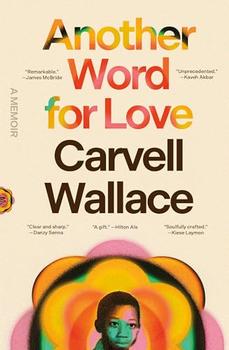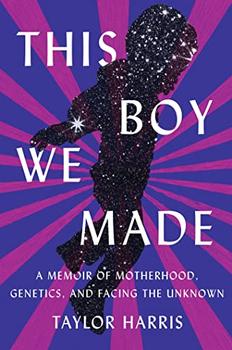Summary | Excerpt | Reviews | Beyond the book | Read-Alikes | Genres & Themes | Author Bio

A Memoir
by Carvell Wallace"I write about beautiful things because I live in a country that has tried to kill me and every single one of my ancestors." This might serve as Carvell Wallace's mission statement. His memoir candidly acknowledges wrongs that have been done—to him personally and to Black people collectively. But he also relates what he has learned about sexuality and spirituality, both of which provoke openness to love and wonder.
Wallace's debut is a nontraditional memoir in 36 mini-essays, grouped under several headings. "Stories About Loss" recreate scenes from his difficult youth. He and his single mother sometimes stayed with his aunt and uncle in the Pittsburgh area; they also spent a year unhoused, and later moved to California. During these years, he had two unforgettable encounters with the LAPD: once, his mother was arrested over a bad check she wrote for a mattress; then, on the first day of the Los Angeles Riots in 1992, a neighbor reported a 17-year-old Wallace to the police for supposedly looking suspicious while smoking a cigarette in the alley behind their apartment building.
Through vividly recreated scenes, Wallace captures the emotions of childhood. Three evocative pieces in a row emphasize a boy's feeling of helplessness. In "The Fog," he remembers having to cross a field full of fog to get to his school's side door after his mother dropped him off late. "The lesson I took from … that day was that no matter how scary a thing was, I was going to have to be able to face it entirely alone." "The Snow," likewise, tells of young Wallace being struck by the implacable force of a snowstorm, coinciding with his feelings of powerlessness in the face of his mother's despair. "The Razors" reveals, matter-of-factly, how an adult close to seven-year-old Wallace threatened the child into performing sexual favors.
It's not the only incident of sexual abuse in the book. Although these recollections can be difficult to read about, some of the later "Stories About Return" provide a sort of antidote to sexual violence, as Wallace realizes the power of consent (in an essay entitled "The No") and reclaims a sense of ownership and joy in his sexuality. He is frank about his sexual experiences with both men and women, and describes using a gay dating app and attending a sex party for people of color.
Sex is just one of the quotidian pleasures that Wallace celebrates. Like Ross Gay (in The Book of Delights et al.), he looks for moments of connection and enjoyment. "The Bread" is a stand-out: while baking and listening to Solange, Wallace muses on the significance of Black art. "When your oppression is communal, your liberation must be as well," he writes, and art is an expression of that freedom. The performing arts were pivotal for him in high school, and he often mentions the music that provided meaning at particular times in his life.
The trio of "Stories About God" at the center of the book tie together the overall themes of art, wonder, and trauma. "The Journalist" recounts Wallace's work on a podcast series about Fred Rogers and ponders the notion of goodness. "The Moon" recalls the mundane epiphany of noticing the moon on a trip he took to the coast through his role as a camp counselor, while "The Lightning" juxtaposes the ancestral suffering of enslavement with the potential for healing. "To return, to be made whole again. That is another word for love."
There is quiet mysticism to Wallace's perspective. He often refers to "god," but the lowercase makes it clear that this is no conventional Christian understanding. It's more a sense of the universe mysteriously working things out to human benefit. His concepts of gender and sexuality are similarly broad, and he explicitly rejects the toxic masculinity that perpetuates cycles of violence: "This is why men are so violent and angry and destructive[:] … We teach each other to hate what we cannot control, and nothing … can be truly controlled.
Marriage and parenting, overcoming addiction, his mother's death, and the pandemic are other topics in these varied and relatable autobiographical essays. Together they depict the chronological sweep of Wallace's life. Readers who expect or prefer a traditional memoir may be frustrated by the structure. One could think of the thematic pieces as being social criticism along the lines of Hanif Abdurraqib's, with the queer coming-of-age material reminiscent of George M. Johnson's All Boys Aren't Blue. This wasn't my usual reading fare, but it's worth taking a risk to encounter an original new voice.
![]() This review
first ran in the June 19, 2024
issue of BookBrowse Recommends.
This review
first ran in the June 19, 2024
issue of BookBrowse Recommends.

If you liked Another Word for Love, try these:

by Erika J. Simpson
Published 2025
From "a writer who's absolutely going places" (Roxane Gay), a remarkable, inventive debut memoir about a mother-daughter relationship across cycles of poverty, separation, and illness, exploring how we forge identity in the face of imminent loss.

by Taylor Harris
Published 2023
A Black mother bumps up against the limits of everything she thought she believed - about science and medicine, about motherhood, and about her faith - in search of the truth about her son.
There are two kinds of people in the world: those who divide the world into two kinds of people, and those who don'...
Click Here to find out who said this, as well as discovering other famous literary quotes!
Your guide toexceptional books
BookBrowse seeks out and recommends the best in contemporary fiction and nonfiction—books that not only engage and entertain but also deepen our understanding of ourselves and the world around us.